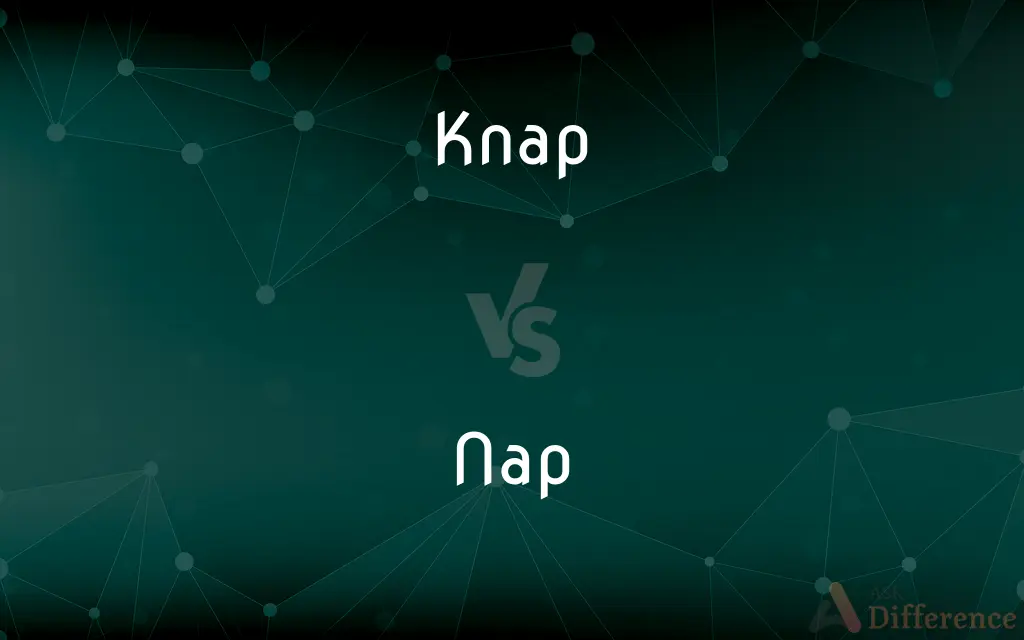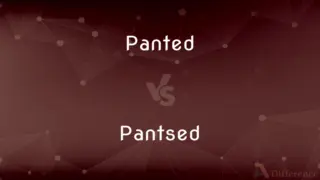Knap vs. Nap — What's the Difference?
By Maham Liaqat & Fiza Rafique — Updated on March 15, 2024
Knap refers to breaking or giving way under pressure, often with a snapping sound, while nap is a short sleep, typically during the day.

Difference Between Knap and Nap
Table of Contents
ADVERTISEMENT
Key Differences
Knap involves the action of breaking something hard, typically with a sharp sound, as seen in stone knapping for tool making. Whereas nap signifies a brief period of sleep, usually taken during the day to refresh oneself.
Knap is often associated with materials or objects that can be fractured or shaped through force, illustrating the physical transformation of materials. On the other hand, nap focuses on the human need for rest and rejuvenation, highlighting a temporary disengagement from activities for health benefits.
While knapping is a skill or process that has been practiced since prehistoric times, especially in the making of stone tools, napping is a universally accessible means of physical and mental restoration, not requiring any special skill.
The term knap may also imply a sudden or quick action, often producing a distinctive sound, such as the knap of breaking branches. Conversely, nap suggests a peaceful and quiet activity, often associated with comfort and relaxation.
Knap's usage is more specialized and less frequent in everyday language, typically related to specific crafts or actions, whereas nap is a common term, used widely across different cultures and ages to describe a short sleep.
ADVERTISEMENT
Comparison Chart
Definition
Breaking or giving way under pressure with a snapping sound.
A short sleep, typically taken during the day.
Context of Use
Often associated with crafts, such as stone tool making.
Common in daily language, referring to rest periods.
Skill Required
Yes, especially in contexts like flintknapping.
No, it's a natural human activity.
Sound Association
Yes, implies a sharp or distinct sound.
No, generally associated with quiet and rest.
Cultural Significance
Historical and craft-related significance.
Universal, related to human health and well-being.
Compare with Definitions
Knap
Breaking with a snap.
The craftsman's precise knap split the flint cleanly in two.
Nap
Moment of relaxation.
Finding a quiet place for a nap was her top priority during the break.
Knap
Making a sharp sound.
The sudden knap of the breaking branch startled the birds into flight.
Nap
Short sleep.
She took a quick nap to recharge after the long journey.
Knap
Skill in stone tool making.
His expertise in knap was evident in the finely crafted arrowheads.
Nap
Essential for well-being.
Incorporating a nap into your daily routine can have numerous health benefits.
Knap
Action requiring force.
With a firm grip and a quick motion, she managed a perfect knap.
Nap
Restful activity.
On the weekend, his favorite activity was taking a long nap in the hammock.
Knap
Sound of breaking.
The knap of dry twigs underfoot broke the silence of the forest.
Nap
Daytime rest.
A twenty-minute nap can greatly improve alertness and performance.
Knap
Knap is a surname, and may refer to:
Nap
A nap is a short period of sleep, typically taken during daytime hours as an adjunct to the usual nocturnal sleep period. Naps are most often taken as a response to drowsiness during waking hours.
Knap
To break or chip (stone) with sharp blows, as in shaping flint or obsidian into tools.
Nap
A brief sleep, often during the day.
Knap
To strike sharply; rap.
Nap
A soft or fuzzy surface on fabric or leather.
Knap
To snap at or bite.
Nap
A trick-taking card game in which the players are each dealt five cards and everyone bids the number of tricks they intend to take, with the highest bidder deciding the trump.
Knap
(transitive) To shape a brittle material having conchoidal fracture, usually a mineral (flint, obsidian, chert etc.), by breaking away flakes, often forming a sharp edge or point.
Nap
The first bid of five tricks in this game, the maximum number in a hand. Also called napoleon.
Knap
(transitive) To rap or strike sharply.
Nap
See napoleon1.
Knap
To bite; to bite off; to break short.
Nap
To sleep for a brief period, often during the day; doze.
Knap
To make a sound of snapping.
Nap
To be unaware of imminent danger or trouble; be off guard
The civil unrest caught the police napping.
Knap
A sharp blow or slap.
Nap
To form or raise a soft or fuzzy surface on (fabric or leather).
Knap
A protuberance; a swelling; a knob.
Nap
To pour or put a sauce or gravy over (a cooked dish) in a thin, even layer
"a stuffed veal chop napped with an elegant Port sauce" (Jay Jacobs).
Knap
The crest of a hill
Nap
A short period of sleep, especially one during the day.
Knap
A small hill
Nap
A soft or fuzzy surface, generally on fabric or leather.
Knap
A protuberance; a swelling; a knob; a button; hence, rising ground; a summit. See Knob, and Knop.
The highest part and knap of the same island.
Nap
The common direction, on some kinds of fabric, of the hairs making up the pile.
If the fabric has a nap, make sure all pieces are cut with the nap going the same direction.
Knap
A sharp blow or slap.
Nap
(British) A type of bet in British horse racing, based on the experts' best tips.
Knap
To bite; to bite off; to break short.
He will knap the spears apieces with his teeth.
He breaketh the bow, and knappeth the spear in sunder.
Nap
A card game in which players take tricks; properly Napoleon.
Knap
To strike smartly; to rap; to snap.
Nap
A bid to take five tricks in the card game Napoleon.
Knap
To make a sound of snapping.
Nap
A cup, bowl.
Knap
Strike sharply;
Rap him on the knuckles
Nap
To have a nap; to sleep for a short period of time, especially during the day.
Knap
Break a small piece off from;
Chip the glass
Chip a tooth
Nap
(figuratively) To be off one's guard.
The regulators were caught napping by the financial collapse.
Nap
To form or raise a soft or fuzzy surface on (fabric or leather).
Nap
(obsolete) To grab; to nab.
Nap
(cooking) To cover (something) with a sauce. usually in the passive
Nap
To have a short sleep; to be drowsy; to doze.
Nap
To be in a careless, secure state; to be unprepared; as, to be caught napping.
I took thee napping, unprepared.
Nap
To raise, or put, a nap on.
Nap
A short sleep; a doze; a siesta.
Nap
Woolly or villous surface of felt, cloth, plants, etc.; an external covering of down, of short fine hairs or fibers forming part of the substance of anything, and lying smoothly in one direction; the pile; as, the nap of cotton flannel or of broadcloth.
Nap
The loops which are cut to make the pile, in velvet.
Nap
Same as Napoleon, 1, below.
Nap
A period of time spent sleeping;
He felt better after a little sleep
There wasn't time for a nap
Nap
A soft or fuzzy surface texture
Nap
The yarn (as in a rug or velvet or corduroy) that stands up from the weave;
For uniform color and texture tailors cut velvet with the pile running the same direction
Nap
A short sleep (usually not in bed)
Nap
A card game similar to whist; usually played for stakes
Nap
Take a siesta;
She naps everyday after lunch for an hour
Common Curiosities
Can knap be used in everyday language?
Yes, but it's less common and usually related to specific contexts like crafts or breaking something hard.
What is a nap?
A nap is a short sleep, usually taken during the day to refresh oneself.
What is knap?
Knap is the action of breaking something hard with a sharp sound, often associated with stone tool making.
How does knap differ from nap?
Knap involves a physical action of breaking, whereas nap is a period of rest or sleep.
Do you need special skills to knap?
Yes, knapping, especially in contexts like stone tool making, requires specific skills and knowledge.
What are the health benefits of napping?
Napping can reduce fatigue, increase alertness, and improve mood and cognitive function.
How is knap relevant today?
Knap is mostly relevant in historical and craft contexts, though the principles can apply in various modern crafting techniques.
Is napping beneficial?
Yes, napping can improve alertness, performance, and overall well-being.
How long should a nap last?
A short nap of about 20-30 minutes is recommended to avoid sleep inertia and maximize benefits.
Can anyone learn to knap?
With practice and guidance, most people can learn the basics of knapping.
Is there a best time of day to nap?
Early to mid-afternoon is considered ideal to prevent interference with nighttime sleep.
What materials can be used for knapping?
Materials like flint, chert, and obsidian are commonly used for knapping due to their conchoidal fracture properties.
Can napping affect nighttime sleep?
Yes, if naps are too long or taken late in the day, they can interfere with nighttime sleep patterns.
Is it necessary to have a specific place for napping?
While not necessary, a quiet and comfortable place can enhance the quality of a nap.
Are there different types of knapping?
Yes, including flintknapping, which involves shaping flint or other stones into tools or objects.
Share Your Discovery

Previous Comparison
Panted vs. Pantsed
Next Comparison
Jeff vs. JeffreyAuthor Spotlight
Written by
Maham LiaqatCo-written by
Fiza RafiqueFiza Rafique is a skilled content writer at AskDifference.com, where she meticulously refines and enhances written pieces. Drawing from her vast editorial expertise, Fiza ensures clarity, accuracy, and precision in every article. Passionate about language, she continually seeks to elevate the quality of content for readers worldwide.














































